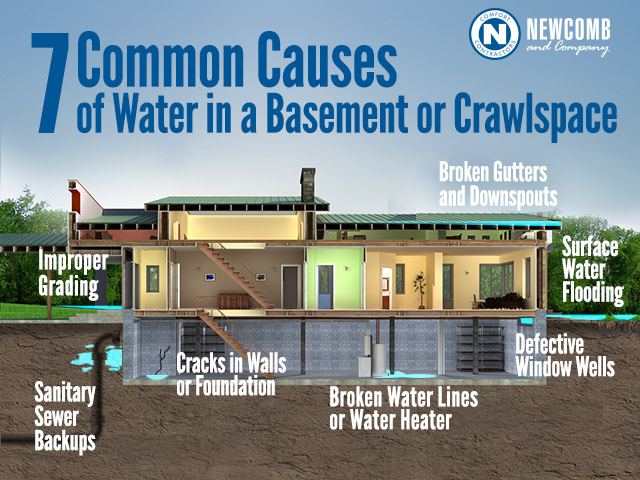7 COMMON CAUSES OF WATER IN A BASEMENT OR CRAWLSPACE
Jul 22, 2014
Why Is There Water in My Basement or Crawlspace?

If you’ve ever had water in your basement or crawlspace, you know how much of a headache it can be. Even the smallest amount of moisture can cause serious property damage to your carpeting, furniture, and the structure of your home itself. It can also lead to mold issues that can damage your home and cause health problems for you and your family.
How can I tell if there is a problem?
Start by looking for standing water. Small pools of water in your basement or crawlspace likely mean that there is an issue somewhere. Don’t assume that just because you don’t see water, you’re in the clear. Damp or humid air, a musty smell, and mold or mildew are also signs that you have excess moisture. Are your walls damp to the touch? Can you see any water trickling or dripping? How do your floors look? Water spots on carpets and rotting wood floors are signs that there is a problem that needs to be addressed. If you find water in your crawlspace or basement in Raleigh or Wilmington call Newcomb and Company to help you fix the problem fast!
Where is the water coming from?
Once you’ve determined that water is leaking into your basement or crawlspace, the next thing you need to do is determine the cause. Here are some of the most common sources of excess water in the basement or crawlspace.
Surface Water Flooding
The ground can’t always absorb heavy rains and melting snow quickly enough. The water table begins to rise and lower floors of your home may flood. If your area is prone to flash floods, like hurricanes in Wilmington NC, you should contact professionals immediately to put the proper systems in place to protect your home and your family.
Improper Slope or Grading of Property
Home sites are supposed to be graded so that the slope of the ground directs water away from the foundation of your home. If this is done incorrectly or if erosion has changed the grading of your land, water can flow towards your home and into your basement or crawlspace.
Missing, Defective, or Improperly Installed Gutters and Downspouts
Gutters and downspouts are designed to collect rainwater from your roof and direct it away from your home. Without them, rain will flow off of the edges of your roof and onto the ground around the perimeter of your home. If you have gutters and downspouts but they are installed improperly, are defective, or are clogged, they won’t do you much good. Extensions at the foot of any downspout should discharge the water a minimum of four feet from your home.
Defective Window Wells
Basements or crawlspaces often have windows or small vents on exterior walls. Window wells should be designed to prevent water from entering; improperly designed or defective window wells will act as a drain, funneling any pooled water directly into your home.
Cracks in Walls or Foundation
Even if the grading, gutters, downspouts, and window wells are all designed and installed properly, they won’t prevent moisture and water from entering your home through cracks in your walls or foundation. Inspect your home regularly to make sure there are no issues. Even the smallest cracks can lead to big problems, so be diligent about checking for them. If you find any cracks, be sure to have them repaired immediately to prevent serious property damage.
Broken Water Lines or Water Heater
Your water lines and water heater are the main vehicles to get water to your sinks, toilets, and showers. Worn out plumbing, frozen pipes, or a puncture due to construction can all lead to broken water lines. A failed water heater can also create serious flooding problems.
Sanitary Sewer Backups
When it rains heavily, the sewer system can become overwhelmed. The water can’t get through the system fast enough and it begins to back up, sometimes causing sewage to come up through the drains. Clogged sewer lines can cause similar problems. As you can imagine, this not only leads to serious property damage, but to health issues as well.
What can I do about it?
Each of the causes outlined above has its own set of solutions. Outside of basic maintenance and fixes such as unclogging drains and gutters or moving downspouts, in most cases, you are best off calling a professional. If you’re located in the Raleigh, Wilmington, Apex, Cary, Garner, or anywhere in the Triangle region of North Carolina, consider calling Newcomb and Company. A professional can diagnose the problem and provide you with solutions to protect your property and your family. Remain diligent and check frequently for moisture, mold, or pools of water in your basement or crawlspace. If you find any, call Newcomb and Company for HVAC service in Raleigh before it gets out of control.
Need help? Call now.